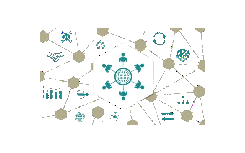At our company, we offer a comprehensive range of technology solutions and services that helps businesses of all sizes and sectors to operate more smoothly, efficiently to stay ahead in the competition and achieve their goals.

Infrastructure on cloud refers to the underlying resources and services needed to run and manage applications and services on cloud platforms. These resources typically include computing power, storage, networking, and security services, among others.
Cloud infrastructure is designed to be highly scalable and flexible, allowing organizations to easily adjust their infrastructure to meet changing demands. It also provides a level of automation and self-service, enabling users to quickly provision and manage resources as needed.
One of the key benefits of cloud infrastructure is its ability to provide on-demand resources, which can be quickly scaled up or down based on the needs of the organization. This means that businesses can avoid the costly upfront investments in hardware and infrastructure that are typically required with traditional on-premise solutions.
Cloud infrastructure also provides a high level of security and reliability, with built-in mechanisms for backup and disaster recovery. Cloud providers typically have large teams of security experts who are dedicated to ensuring the security of their infrastructure and services.
Data protection is the practice of safeguarding sensitive information from unauthorized access, use, disclosure, or destruction. This can include personal information such as names, addresses, and financial data, as well as confidential business information such as trade secrets and intellectual property.
Data protection is becoming increasingly important in today’s digital age, where large amounts of sensitive information are stored and transmitted online. The risks of data breaches, cyberattacks, and other security threats have made data protection a critical concern for businesses, governments, and individuals alike.


Cybersecurity refers to the practice of protecting computer systems, networks, and sensitive information from unauthorized access, theft, or damage. With the increasing dependence on technology and the proliferation of cyberattacks, cybersecurity has become a critical concern for organizations and individuals alike.
Overall, effective cybersecurity is essential for businesses, governments, and individuals to ensure the privacy and security of sensitive information. By implementing best practices, complying with cybersecurity regulations, and staying vigilant against emerging threats, organizations can help minimize the risk of cyberattacks and protect their reputation and bottom line.
Software solutions refer to software applications or platforms that are designed to address specific business needs or challenges. These solutions can range from off-the-shelf products to customized software development projects that are tailored to meet the specific requirements of an organization.
Overall, software solutions are an essential component of modern business operations, providing businesses with the tools and insights needed to succeed in a competitive marketplace. By leveraging software solutions to improve efficiency, streamline operations, and enhance decision-making, businesses can achieve their goals and drive growth and profitability.


Fleet management systems are software solutions designed to help businesses manage their vehicle fleets more effectively. These systems provide a centralized platform for managing vehicle data and automating key fleet management processes, such as maintenance scheduling, fuel management, and driver tracking.
Fleet management systems can help businesses improve efficiency, reduce costs, and enhance safety by providing real-time visibility into fleet operations and automating manual processes.
Kiosk solutions are interactive self-service systems that are typically used in retail, hospitality, and other industries to provide customers with quick and convenient access to information, products, and services. These solutions typically consist of a touchscreen interface and specialized software that allows customers to interact with the system and complete transactions or obtain information.
Kiosk solutions can be used for a wide range of applications, from self-checkout and ticketing systems to interactive product displays and informational kiosks.
Video safety systems are software solutions that utilize video technology to improve safety and security in various settings, such as workplaces, schools, and public spaces. These systems typically involve the use of cameras and sensors to capture video footage of a given area and can be used to monitor for potential safety hazards or security threats.
Unified Communication (UC) systems are combination of Software and Hardware solutions that integrate various communication tools and services into a single platform. These platforms bring together a range of communication technologies, including voice, video, messaging, and conferencing, to create a seamless and integrated communication experience.
Some common features of Unified Communication systems include:
Voice and Telephony: UC systems allow users to make and receive voice calls from any device, including smartphones, desktops, and laptops. These systems typically include features such as call forwarding, voicemail, and call routing, making it easy to manage and prioritize communications.
Video Conferencing: UC systems typically include video conferencing capabilities, allowing users to collaborate and communicate with colleagues and customers from anywhere in the world. These systems often include features such as screen sharing and virtual whiteboards, making it easy to work together in real-time.
Instant Messaging: UC systems often include instant messaging capabilities, allowing users to communicate in real-time with colleagues and customers. These systems may include features such as group messaging and file sharing, making it easy to collaborate and share information.
Email Integration: UC systems can be integrated with email platforms, allowing users to manage and prioritize email communications alongside other communication channels. This can help to improve efficiency and ensure that important communications are not overlooked.
Mobile Integration: UC systems often include mobile integration capabilities, allowing users to access communication tools and services from their smartphones and other mobile devices. This can be particularly valuable for remote workers and teams who need to stay connected and collaborate from anywhere.
Overall, Unified Communication systems are an effective way for businesses to improve communication and collaboration across their organization. By integrating various communication tools and services into a single platform, UC systems provide a seamless and integrated communication experience, making it easy to stay connected and collaborate from anywhere.


Contact center solutions and services are software solutions designed to improve customer interactions and support across various channels, including phone, email, chat, and social media. These systems typically include a range of features and capabilities, including:
Multi-channel Support: Contact center solutions enable businesses to interact with customers across various channels, providing seamless experiences regardless of the customer’s preferred communication method. This includes features such as phone, email, chat, social media, and more.
Call Routing: Call routing features enable businesses to route calls to the appropriate agent or department based on the customer’s needs. This can include skills-based routing, which directs calls to the agent with the appropriate skills to handle the customer’s specific issue.
CRM Integration: Many contact center solutions integrate with customer relationship management (CRM) systems, providing agents with valuable customer information to personalize interactions and resolve issues more efficiently.
Analytics and Reporting: Contact center solutions provide businesses with valuable insights into call volumes, response times, and other key metrics, allowing businesses to optimize their operations and improve customer satisfaction.
Automation and AI: Many contact center solutions leverage automation and artificial intelligence (AI) to handle simple customer inquiries and support tasks. This frees up agents to focus on more complex issues, improving productivity and reducing wait times for customers.
Overall, contact center solutions and services are an effective way for businesses to improve customer interactions and support across various channels. By providing a seamless and integrated customer experience, these systems can help businesses to improve customer satisfaction, retention, and loyalty.
Electronic security refers to the use of electronic technology to protect people, assets, and information from unauthorized access, theft, damage, or other security threats. Electronic security systems typically include a combination of hardware and software components, such as cameras, alarms, access control systems, and monitoring software.
Smart audio and video solutions refer to the use of connected devices and software to improve the quality and functionality of audio and video systems. These solutions typically include a range of features and capabilities.






























If you have any questions and comments about our Solutions and Services , please feel free to email us at info@cosmitronics.com